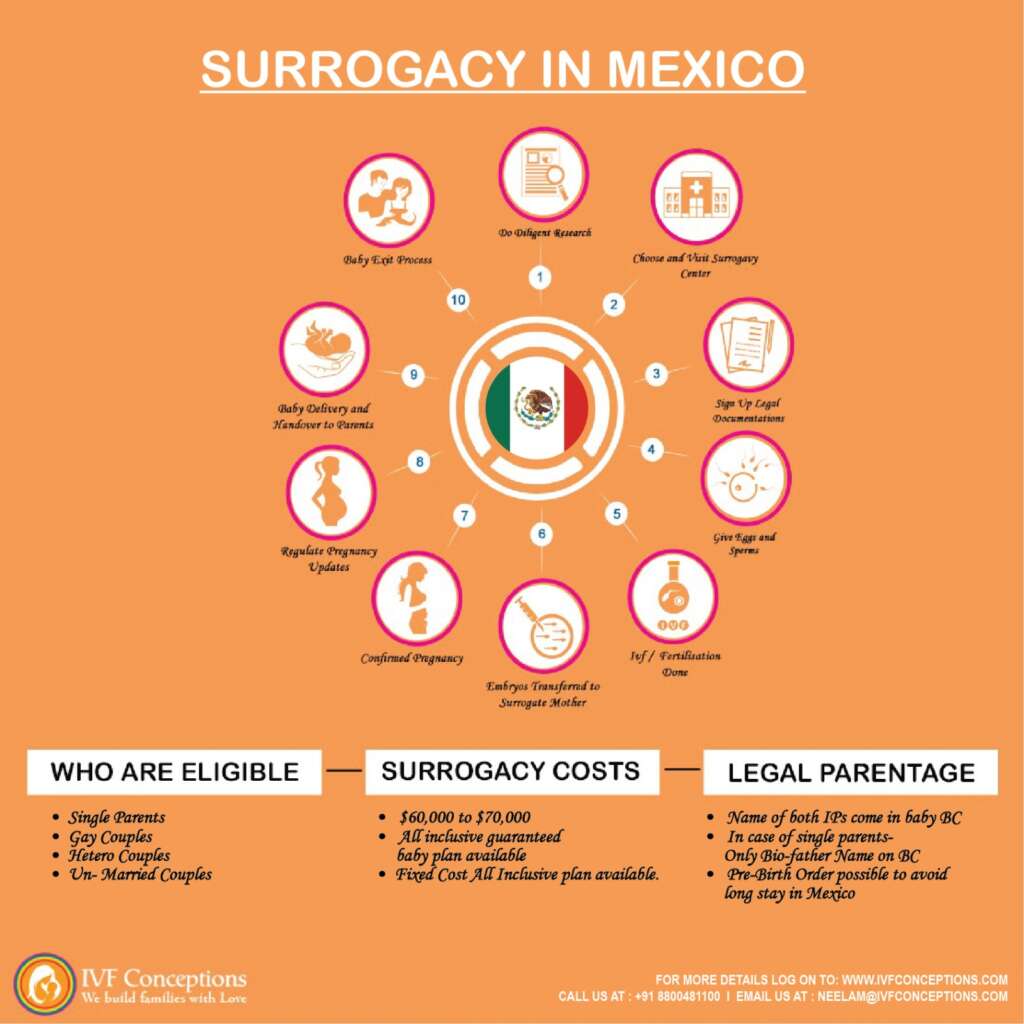Is Surrogacy Legal in Mexico? Know the Facts
If you are considering surrogacy as a means to start or expand your family in Mexico, it is essential to understand the legal landscape surrounding surrogacy in Mexico. Surrogacy laws can be complex and vary by jurisdiction, making it crucial for intended parents to be well-informed before embarking on this journey. In this article, we will explore the legality of surrogacy in Mexico, the regulations in place, and the risks and limitations involved.
- Book an online appointment: Get a free online consultation.
- Call\W:+91-8800481100 Email:neelam@ivfconceptions.com
Key Takeaways:
- Surrogacy laws in Mexico are incomplete and subject to wide interpretation.
- No legal framework exists to protect foreign intended parents in Mexico.
- The implementation of surrogacy laws varies by state, leading to discrepancies and challenges for intended parents.
- Foreign intended parents must navigate the legal requirements set by individual states when pursuing surrogacy in Mexico.
- It is crucial for intended parents to work with knowledgeable professionals and surrogacy agencies to ensure compliance with the legal process.
Additional Resources to Read:
Understanding Surrogate Age Requirements
Independent vs Agency Assisted Surrogacy: Compare and Choose
International Surrogacy Agency – Expert Guidance & Support
What are the Requirements of Surrogacy
Understanding Surrogacy Laws in Mexico

When considering surrogacy in Mexico, it is crucial to understand the intricacies of the country’s surrogacy laws and regulations. The legal landscape surrounding surrogacy is evolving, with both benefits and challenges for prospective intended parents. This section aims to provide an overview of the key aspects of surrogacy laws in Mexico, including the evolution of regulations, state vs. federal jurisdiction, and the legal process for foreigners.
The Evolution of Mexican Surrogacy Regulations
In recent years, Mexican surrogacy regulations have undergone significant changes. In late 2021, the Mexican Supreme Court declared surrogacy a protected medical procedure. This landmark ruling extended the right to pursue surrogacy to all individuals, including married and single Parents, same-sex couples, and foreign intended parents.
While this ruling offers greater accessibility to surrogacy in Mexico, it is important to note that the implementation of surrogacy laws varies by state. The Supreme Court’s directive does not automatically guarantee consistent practices across the country.
State vs Federal Jurisdiction on Surrogacy
 Surrogacy laws in Mexico are subject to the jurisdiction of individual states. While the Supreme Court ruling provides a framework for surrogacy protection, each state has the authority to enforce or restrict surrogacy practices within its boundaries.
Surrogacy laws in Mexico are subject to the jurisdiction of individual states. While the Supreme Court ruling provides a framework for surrogacy protection, each state has the authority to enforce or restrict surrogacy practices within its boundaries.
The variation in surrogacy laws among states can result in discrepancies and challenges for intended parents. For example, some states allow intended parents to be listed on their baby’s birth certificate immediately upon birth, while others still legally recognize the surrogate as the mother. These discrepancies create legal and administrative hurdles that must be navigated by those pursuing surrogacy in Mexico.
Surrogacy in Mexico Legal Process for Foreigners
For foreigners interested in pursuing surrogacy in Mexico, understanding the legal requirements is essential. Intended parents must meet specific criteria such as age, marital status, and the inability to carry a pregnancy. These requirements may vary depending on the state and individual circumstances.
To ensure compliance with the legal process, it is advisable for foreign intended parents to seek the guidance of knowledgeable professionals and reputable surrogacy agencies. Engaging the services of experts in Mexican surrogacy regulations can help navigate the complex legal landscape and ensure a smoother experience.
Beside this, consult a local immigration attorney in your home country to keep in mind that you need to take baby home with proper travel documents and you would like to keep this in mind.
| Key Points | Explanation |
| Evolution of Surrogacy Regulations | Significant changes in recent years, with the Mexican Supreme Court declaring surrogacy a protected medical procedure. |
| State vs. Federal Jurisdiction | Surrogacy laws in Mexico vary by state, with individual states having the authority to enforce or restrict surrogacy practices. |
| Legal Process for Foreigners | Foreign intended parents must meet specific criteria and work with knowledgeable professionals to ensure compliance with the legal process. |
The Surrogacy Process in Mexico Explained

The surrogacy process in Mexico involves several important steps that intended parents and gestational mothers must navigate to ensure a successful journey. From screening and legal agreements to the surrogacy birth and citizenship process, understanding the process is crucial for all parties involved. Additionally, protecting surrogacy rights in Mexico requires careful attention to the legal framework and documentation. Let’s explore each step in detail.
Supreme Court of Justice of the Nation On June 5, 2021, the Supreme Court of Justice of the Nation (SCJN) ruled in favor of regulating surrogacy, based on the modification of the Civil Code of Tabasco on the matter. With a majority of nine votes to two, the SCJN has opened the door in its plenary discussion for each State to decide whether to regulate the economic conditions for the practice of surrogacy or what is left to the freedom of the individuals involved. The Court considers “unfounded that there is an obligation for local legislatures to provide for a free surrogacy agreement.” Therefore, the State can oblige him to be free, establish payment conditions or leave the matter to the criteria of a private agreement.
Screening and Legal Agreements
Before embarking on a surrogacy journey in Mexico, intended parents and potential surrogates undergo a thorough evaluation process. This includes medical, psychological, and legal assessments to ensure a suitable match. The screening process is essential to protect the well-being of all individuals involved and to address any potential risks or complications.
Once a suitable match is found, the parties enter into legal agreements that outline their roles, responsibilities, and rights throughout the surrogacy process. These agreements establish clear guidelines and expectations, protecting both the intended parents and the surrogate. It is crucial for all parties to seek legal counsel and ensure comprehensive legal agreements are in place before proceeding.
Surrogacy Birth and Citizenship Process
 The surrogacy birth and citizenship process in Mexico can vary depending on the state and its specific surrogacy regulations. Some states allow intended parents to be named on the birth certificate immediately upon the baby’s birth. However, other states may have additional legal steps and requirements to establish parentage.
The surrogacy birth and citizenship process in Mexico can vary depending on the state and its specific surrogacy regulations. Some states allow intended parents to be named on the birth certificate immediately upon the baby’s birth. However, other states may have additional legal steps and requirements to establish parentage.
It is important for intended parents to thoroughly research and understand the specific requirements and procedures in their chosen state. Consulting with experienced surrogacy professionals and legal experts is essential to navigate the process and ensure compliance with all necessary legal steps.
Protecting Surrogacy Rights in Mexico
Protecting surrogacy rights in Mexico is of paramount importance for all parties involved. Intended parents should work closely with experienced surrogacy professionals and legal experts who specialize in Mexican surrogacy laws. This ensures that their rights as parents are safeguarded throughout the surrogacy journey.
Intended parents should seek legal advice to fully understand the legal framework and ensure compliance with all applicable laws and regulations. Properly documenting all agreements and consents is crucial, as it provides a strong foundation to protect surrogacy rights. Being prepared for potential legal challenges and having a knowledgeable support system in place is vital to navigate any legal complexities that may arise.
As compared to other countries, surrogate mother in Mexico, have higher compensation and also slight waiting list in most of the surrogacy clinics in Mexico.
Who can do surrogacy in Mexico
All families types can do surrogacy in Mexico country. It is must to have at least one genetic link with the intended parents and it should be a gestational surrogacy only.
- Married hetero couples
- Not married hetero couples
- Single males
- Single females
- Gay couples
Cost of Surrogacy in Mexico

The cost of surrogacy in Mexico can vary depending on various factors. The typical cost of surrogacy in Mexico is in the range of $55,000 to $85,000 based on what types of services you need and what is the location and reputation of the surrogacy agency in the Mexico.
It is crucial for intended parents to have a comprehensive understanding of the potential financial obligations involved in a surrogacy journey.
Comparing Costs: Mexico vs. Other Countries
When considering surrogacy, comparing costs between Mexico and other countries is an important consideration for intended parents. Mexico may offer a more affordable option compared to countries like the United States. However, if you compare with the other international countries the cost is higher. The average cots of surrogacy in Colombia and Argentina is almost $10,000 less than Mexico.
Here is table for cheapest countries for surrogacy:
| Country | Regulation & Organization | Who are allowed to participate | Surrogacy Cost | Legal Assurance |
|---|---|---|---|---|
| Colombia | Altruistic | Singles, gay couples, hetero couples | Affordable
$70,000 |
Reliable |
| Mexico | Altruistic | Singles, gay couples, hetero couples | Affordable
$70,000 to $80,000 |
Reliable |
| USA | Commercial | Singles, gay couples, hetero couples | Costly
$150,000+ |
Strong |
| Ukraine | Commercial | Hetero couples | Affordable
$60,000 |
Strong |
| Georgia | Commercial | Hetero couples | Affordable
$60,000 |
Strong |
| Greece | Altruistic | Hetero couples and single women | Affordable
$80,000 |
Strong |
Additional Resources to Read:
IVF vs IUI: Comparing Fertility Treatment Options
How to Find a Surrogate Mother in Mexico
Conclusion
In conclusion, surrogacy in Mexico is a complex and evolving landscape. While surrogacy is declared legal by the Mexican Supreme Court, the implementation and enforcement of laws vary by state. Foreign intended parents should exercise caution and seek professional guidance when considering surrogacy in Mexico, understanding the risks and limitations involved. It is crucial to stay informed about the current surrogacy laws and regulations, work with experienced professionals, and prioritize the protection of surrogacy rights throughout the journey.
If you’d like to learn more about IVF, Egg Donation, or surrogacy services globally, check out the rest of our website at Georgia Surrogacy Agency. We offer legally secure and affordable surrogacy consulting services for FREE.
Our team has over 14 years of experience facilitating surrogacy arrangements, egg donation, and serving as an advocacy resource for infertile couples and LGBTQ individuals seeking to build families.
For more resources on IVF and Surrogacy, browse our other web page- IVF Conceptions.
For more resources on IVF and Surrogacy, browse our other web page- Complete Surrogacy.
FAQ for Surrogacy in Mexico
Is surrogacy legal in Mexico?
While surrogacy is declared legal by the Mexican Supreme Court, the implementation and enforcement of laws vary by state. It is important for intended parents to understand the specific regulations in their chosen state.
What is the evolution of Mexican surrogacy regulations?
In late 2021, the Mexican Supreme Court declared surrogacy a protected medical procedure, allowing married, single, gay, straight, and foreign intended parents to pursue surrogacy in Mexico. However, the implementation of surrogacy laws varies by state.
What is the state vs. federal jurisdiction on surrogacy in Mexico?
While the Mexican Supreme Court ruling has provided a framework for surrogacy protection, individual states still have the authority to enforce or restrict surrogacy practices. This can result in discrepancies and challenges for intended parents.
What is the surrogacy process in Mexico for foreigners?
The surrogacy process in Mexico for foreigners involves navigating the specific legal requirements set by individual states. Intended parents must meet certain criteria, such as age, marital status, and the inability to carry a pregnancy. Professional guidance and assistance are recommended to ensure compliance with the legal process.
How does the surrogacy birth and citizenship process work in Mexico?
The surrogacy birth and citizenship process in Mexico can vary depending on the state and its specific surrogacy regulations. While some states allow intended parents to be named on the birth certificate immediately, others may require additional legal steps to establish parentage.
How can surrogacy rights be protected in Mexico?
It is crucial for intended parents to work closely with experienced surrogacy professionals and legal experts to ensure that their rights as parents are protected throughout the surrogacy process. This includes understanding the legal framework, documenting all agreements and consent, and being prepared for potential legal challenges.
What is the cost of surrogacy in Mexico?
The cost of surrogacy in Mexico can vary depending on various factors, including location, agency fees, medical expenses, surrogate compensation, legal fees, and other associated costs. It is important for intended parents to have a comprehensive understanding of the potential financial obligations involved.
How does the cost of surrogacy in Mexico compare to other countries?
Comparing costs between Mexico and other countries is an important consideration for intended parents. While Mexico may offer a more affordable option compared to countries like the United States, it is crucial to weigh the costs against the legal and logistical challenges that may arise.
What are the hidden expenses in surrogacy arrangements?
Hidden expenses in surrogacy arrangements should be carefully considered when budgeting for the surrogacy process. These can include additional medical procedures, unexpected legal fees, travel expenses, and other unforeseen costs. Intended parents should work closely with their agency and surrogacy professionals to ensure a comprehensive understanding of all potential expenses.

Highly esteemed, authoritative, and trusted professional with a 14-year of experience in international surrogacy. Advocate for Secure, Legal, and Affordable International Surrogacy.
Neelam Chhagani, MA (Counselling Psychology) and Holistic Infertility and Third-Party Reproduction Consultant.
Member of European Fertility Society, Best Surrogacy Blogger of 2020, with 300 dedicated blogs, and top contributor on Quora for Surrogacy.


Add Your Comment